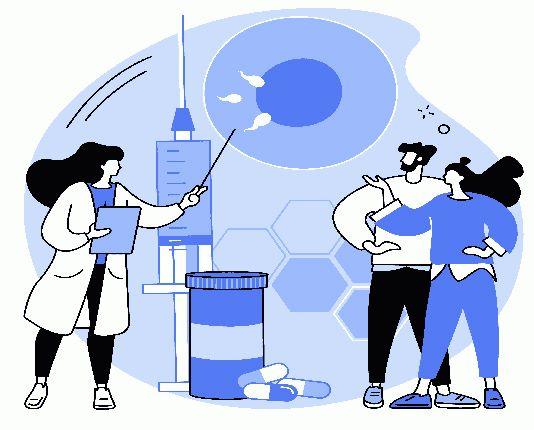Why Egg Freezing is done?
Egg freezing may be performed in a number of circumstances, including:
- Age-related fertility decline: As women age, their fertility naturally decreases. If a woman is not yet ready to have children but wants to preserve her fertility for the future, she may wish to consider egg freezing.
- Medical procedures that could impair fertility include chemotherapy and radiation therapy, which can harm eggs and impair fertility. Egg freezing can help preserve a woman’s fertility before undergoing these treatments.
- Risk of premature ovarian failure: Some women have a higher risk of developing premature ovarian failure, which is the loss of ovarian function before the age of 40. Egg freezing can be a fertility preservation option for these women.
What is the Egg Freezing Procedure
The procedure for egg freezing typically involves several steps, including hormone therapy, ultrasound examinations, and a surgical procedure to extract the eggs. The exact steps involved in the process may vary depending on the individual and the specific circumstances, but generally, the procedure is as follows:
- Hormone therapy: The first step in the egg-freezing process is to stimulate the ovaries to produce multiple eggs. This is typically done using hormones, such as follicle-stimulating hormone (FSH) and luteinizing hormone (LH), which are administered through injections or a patch placed on the skin.
- Ultrasound examinations: After the ovaries have been stimulated, the woman will undergo regular ultrasound examinations to monitor the growth of the eggs. These checks will enable the doctor to decide when the eggs are developed and prepared for extraction.
- Egg retrieval: Once the eggs are mature, the woman will undergo a surgical procedure to extract the eggs from the ovaries. This is typically done using a needle that is guided through the vagina and into the ovaries using ultrasound imaging. Afterwards, the eggs are taken from the follicles and gathered.
- Egg freezing: The extracted eggs are then frozen using a process called vitrification, which involves rapid cooling to very low temperatures in order to preserve the eggs in a state of suspended animation. The eggs are placed in a special freezing solution and then frozen using liquid nitrogen.
Once the eggs are frozen, they can be stored in a frozen state until the woman is ready to use them to try to conceive a child. The eggs will be thawed and fertilized utilizing in vitro fertilisation (IVF) procedures when the woman is ready to use them. The resultant embryos can subsequently be placed into the woman’s uterus to conceive a child successfully.
Factors that impact the success of egg freezing –
There are several factors that can impact the success of egg freezing, including the woman’s age, the number of eggs frozen, and the quality of the eggs. Here are some specific factors that can affect the success of egg freezing:
- Age: The younger a woman is when she undergoes egg freezing, the more likely it is that the eggs will be of good quality and will be able to be successfully fertilized and implanted. As a woman gets older, the quality of her eggs declines, which can reduce the chances of a successful pregnancy.
- A number of eggs frozen: The more eggs that are frozen, the greater the chances of achieving a successful pregnancy. For example, not all fertilized eggs will develop into healthy embryos, and not all eggs will survive the freezing and thawing process.
- Quality of eggs: The quality of the eggs is a major factor in the success of egg freezing. High-quality eggs are more likely to withstand freezing and thawing, survive fertilization, and successfully implant.
- Fertility clinic: The success rate of egg freezing can also vary depending on the fertility clinic where the procedure is performed. It
- is important to choose a clinic with a proven track record of success in egg freezing and other fertility treatments.
What are the possible benefits and risks associated with egg freezing?
There are several potential benefits to egg freezing:
-
Egg freezing allows women to preserve their fertility and potentially have children at a later time, which can be particularly beneficial for women who are not yet ready to have children but are concerned about their fertility declines with age.
-
Personal and career goals:
Egg freezing can give women the opportunity to focus on their personal and career goals without having to worry about their fertility.
-
Health concerns:
Some women may choose to freeze their eggs due to medical conditions that may affect their fertility, such as cancer or autoimmune diseases.
However, there are also potential risks and limitations associated with egg freezing. Some of these include:
-
Success rates:
The success rate for egg freezing can vary depending on a number of factors, including the age of the woman at the time of egg freezing and the quality of the eggs.
-
Cost:
It can be expensive, and the cost may not be covered by insurance.
-
Hormonal injections:
The process involves taking hormonal injections to stimulate the ovaries, which can have side effects such as bloating, mood changes, and discomfort.
-
Ethical considerations:
There are also ethical considerations surrounding egg freezing, including the possibility of exploitation or coercion, particularly for women who may be financially disadvantaged.
What is the Average cost of Egg Freezing?
The cost of egg freezing can vary widely depending on a number of factors, including the location of the fertility clinic, the number of eggs that are being frozen, and the specific procedures and medications that are being used.
On average, the cost of egg freezing can range from 1,00,000 to 2,50,000 for the initial cycle, with additional costs for storage and any future thaw and fertilization procedures. Some fertility clinics may offer financing options or discounts for multiple cycles.
It is important to discuss the cost of egg freezing with a fertility specialist before starting the process, as well as to consider whether insurance may cover some or all of the costs.
Do’s and Don’t
Do’s
- Do consult with a fertility specialist
- Do consider your age
- Do freeze multiple eggs
- Do take care of your overall health
Don’t
- Don’t delay the process:
- Don’t skip the hormone therapy
- Don’t ignore any potential health issues




